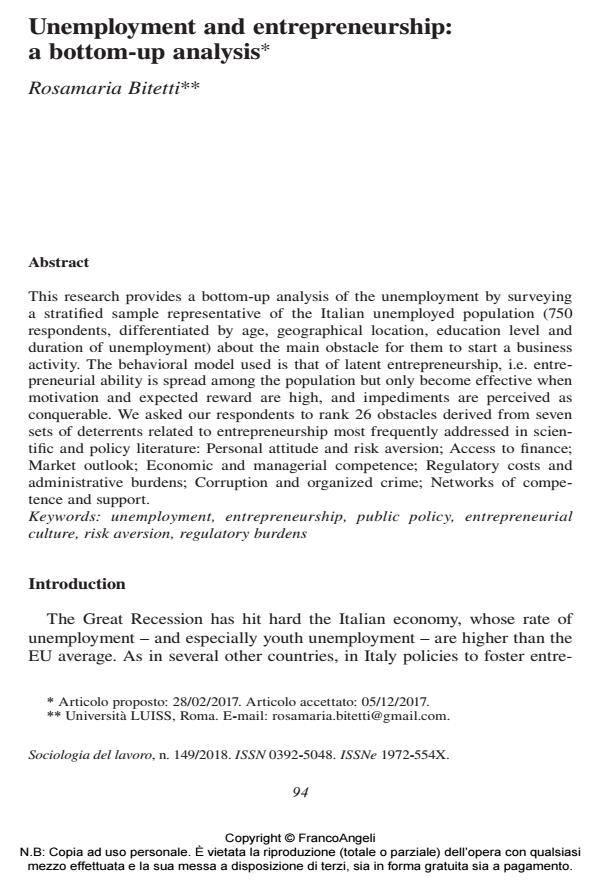Unemployment and entrepreneurship: a bottom-up analysis
Journal title SOCIOLOGIA DEL LAVORO
Author/s Rosamaria Bitetti
Publishing Year 2018 Issue 2018/149 Language English
Pages 24 P. 94-117 File size 170 KB
DOI 10.3280/SL2018-149007
DOI is like a bar code for intellectual property: to have more infomation
click here
Below, you can see the article first page
If you want to buy this article in PDF format, you can do it, following the instructions to buy download credits

FrancoAngeli is member of Publishers International Linking Association, Inc (PILA), a not-for-profit association which run the CrossRef service enabling links to and from online scholarly content.
This research provides a bottom-up analysis of the unemployment by surveying a stratified sample representative of the Italian unemployed population (750 respondents, differentiated by age, geographical location, education level and duration of unemployment) about the main obstacle for them to start a business activity. The behavioral model used is that of latent entrepreneurship, i.e. entrepreneurial ability is spread among the population but only become effective when motivation and expected reward are high, and impediments are perceived as conquerable. We asked our respondents to rank 26 obstacles derived from seven sets of deterrents related to entrepreneurship most frequently addressed in scientific and policy literature: Personal attitude and risk aversion; Access to finance; Market outlook; Economic and managerial competence; Regulatory costs and administrative burdens; Corruption and organized crime; Networks of competence and support.
Keywords: Unemployment, entrepreneurship, public policy, entrepreneurial culture, risk aversion, regulatory burdens
- Pigou A.C. (1932). The Economics of Welfare. London: Macmillan and Co.
- Praag M.C. van (1999). Some classic views on entrepreneurship. De Economist, 147: 311-335.
- Schumpeter J.A. (1942). Socialism, capitalism and democracy. New York: Harper and Bros.
- Storey D.J. (2003). Entrepreneurship, Small and Medium Sized Enterprises and Public Policie. In: Acs Z.J., Audretsch D.B., eds., Handbook of Entrepreneurship Research. Dordrecht: Kluwer Academic Publishers.
- Teoldi F. (2013). La crisi pagata dai trentenni. LaVoce.
- Thornton P. (1999). The Sociology of Entrepreneurship. Annual Review of Sociology, 25: 19-46.
- Transparency International (2016). 2016 Corruption Perceptions Index, www.transparency.org/research/cpi/overview.
- Tullock G. (1967). The Welfare Cost of Tariffs, Monopoly, and Theft. Western Economic Journal, V: 224-232.
- Wennekers A.R.M., Thurik A.R. (1999). Linking entrepreneurship and economic growth. Small Business Economics, 13: 27-55.
- World Bank (2017). Doing Business. World Bank, Washington DC.
- OECD (2014). National programmes for SMEs and entrepreneurship in Italy. Key Issues and Policies, OECD Publishing, Paris.
- OECD (2008). Introductory Handbook for Undertaking Regulatory Impact Analysis. Paris: OECD Publishing.
- OECD (1998). Fostering entrepreneurship, the OECD jobs strategy. Paris: OECD Publishing.
- McChesney F.S. (1987). Rent Extraction and Rent Creation in the Economic Theory of Regulation. Journal of Legal Studies, XVI: 101-118.
- Lumpkin G.T., Dess G.G. (1996). Clarifying the entrepreneurial orientation construct and linking it to performance. Academy of Management Review, 21: 135-172.
- Liñán F., Fayolle A. (2015). A systematic literature review on Entrepreneurial Intentions: Citation, Thematic Analyses, and Research Agenda. International Entrepreneurship and Management Journal, 11: 907-933.
- Lavoie D. (1994). Cultural Studies and the Conditions for Entrepreneurship. The Cultural Context of Economics and Politics, Boxx T.W., Quinlivan G.M., eds. Lanham: University Press of America, Inc.
- Krueger N.F. Jr, Reilly M.D., Carsrudc A.L. (2000). Competing models of entrepreneurial intentions. Journal of Business Venturing, 15(5-6): 411-432.
- Koske I., Wanner I., Bitetti R., Barbiero O. (2014). The 2013 update of the OECD product market regulation indicators: policy insights for OECD and non-OECD countries. OECD Economics Department Working Papers, 2014.
- Knight F.H. (1921). Risk, Uncertainty, and Profit. Boston: Houghton Mifflin.
- Klapper L., Lusardi A., Van Oudheusden P. (2015). Financial Literacy Around the World, Insights From The Standard & Poor’s Ratings Services Global Financial Literacy Survey, www.finlit.mhfi.com.
- Kirzner I. (1997). How Markets Work: Disequilibrium, Entrepreneurship and Discovery. London: IEA.
- Katz J., Gartner W. (1988). Properties of emerging organizations. Academy of Management Review, 13: 429-441.
- Heritage Foundation (2017). Index of Economic Freedom. Heritage foundation, DC.
- Hayek F.A. (1945). The Use of Knowledge in Society. American Economic Review, 4: 519-530.
- Hayek F.A. (1952). The sensory order: An inquiry into the foundations of theoretical psychology. Chicago: University of Chicago Press.
- Ferreira A.S.M., Loiola E., Gondim S.M.G. (2017). Individual and contextual predictors of entrepreneurial intention among undergraduates: a literature review. In Cadernos EBAPE.BR, 2, Article 6.
- Falasca P. (2011). Terroni 2.0. Rubbettino: Soveria Mannelli.
- EC (2012). Reigniting the entrepreneurial spirit in Europe. COM/2012/0795.
- Djankov S. et al. (2002). The Regulation of Entry. Quarterly Journal of Economics, vol. CXVII, 1.
- Bull I., Willard G.E. (1993). Towards a theory of entrepreneurship. Journal of Business Venturing, 8: 183-195.
- Bird B. (1988). Implementing entrepreneurial ideas: The case for intentions. Academy of Management Review, 13: 442-454.
- Banfield E.C. (1967). The moral basis of a backward society. New York, NY: Free Press.
- Aghion P., Howitt P. (1997). Endogenous Growth Theory. Cambridge: MA, MIT Press.
- L'innovazione sociale nelle politiche urbane. Un caso studio nel contesto italiano Luca Tricarico, Rosamaria Bitetti, Maria Isabella Leone, in TERRITORIO 96/2021 pp.108
DOI: 10.3280/TR2021-096010 - The Nexus of Social Cause Interest and Entrepreneurial Mindset: Driving Socioeconomic Sustainability Rob Kim Marjerison, Rongjuan Chen, Yinan Lin, in Sustainability /2021 pp.13558
DOI: 10.3390/su132413558 - Economic Factors Influencing Entrepreneurial Activities: Literature Review Amineh Zivari, Mohsen Mohammadi Khyareh, Reza Mazhari, in Roshd -e- Fanavari /2020 pp.32
DOI: 10.52547/jstpi.20815.16.62.32
Rosamaria Bitetti, Unemployment and entrepreneurship: a bottom-up analysis in "SOCIOLOGIA DEL LAVORO " 149/2018, pp 94-117, DOI: 10.3280/SL2018-149007